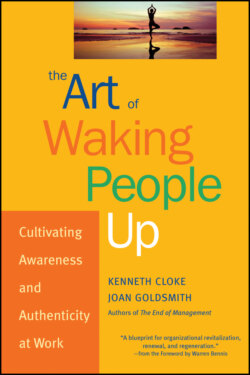Читать книгу The Art of Waking People Up - Kenneth Cloke - Страница 39
Turnaround Feedback, Coaching, Mentoring, and Assessment
ОглавлениеMany of the opportunities for waking up occur at work as a result of feedback, coaching, mentoring, and performance assessment. The pain we experience in waking up, listening to information we do not want to hear, letting go of old behaviors, and acting in new, inexperienced ways makes delivery of honest turnaround feedback, coaching, mentoring, and assessment both essential and dangerous. Yet without honest turnaround processes, we can easily collude in our own stagnation, remain asleep, and continue along old trajectories that are demonstrably unsuccessful. Without turnaround feedback, coaching, mentoring, and assessment, it is difficult even to conceive of waking up, especially when hierarchy, fear, and the status quo lull us into complacency.
The processes, techniques, systems, and relationships we use to encourage awareness and organizational learning must therefore meet four criteria. First, they need to be at least as honest as the degree of resistance they seek to overcome. Second, they need to be at least as complex, integrated, and robust as the organizational purposes they support, the challenges they address, and the environments they influence. Third, they need to be at least as rapid in their ability to adapt, evolve, and develop methods of self-correction as the changes taking place in employees, organizations, the immediate environment, and the outside world. Fourth, they need to be at least as participatory, egalitarian, democratic, and collaborative as the relationships that are influenced by them.
In every workplace where learning is valued, employees need periodically to review and renew their work skills, honestly assess their strengths and weaknesses, collaboratively coach and mentor each other, constructively resolve their conflicts, and learn from their mistakes. This means that traditional, hierarchical organizational processes must be transformed by making them more honest, complex, rapid, and participatory. This means reinventing traditional improvement processes. It means developing turnaround feedback, transformational coaching, strategic mentoring, and participatory assessment processes that promote self-reflection, self-correction, collaboration, and continuous improvement. These new forms actively encourage people to wake up, turn their lives around, and cultivate awareness, authenticity, congruence, and commitment. How do they do so?
Feedback is a process by which information is transmitted or fed back to someone regarding their attitude, behavior, or performance. Traditional hierarchical feedback often results in increased resistance. Turnaround feedback is concerned not only with transmitting information regarding skills and achievements but with dismantling sources of resistance and identifying the defenses, knots, obstacles, misperceptions, and underlying dysfunctions that block improvement.
Coaching is a partnership in which feedback is used to improve the details of an employee’s performance. Transformational coaches work to release their partners from the physical, mental, emotional, and spiritual confines that limit their capacity to succeed. Coaches often come from outside the hierarchy and are not entangled in the relationships or social networks of the person being coached. Some coaches are from completely different venues or fields, allowing them to bring an external perspective to the performance, while others are masters in their fields. Coaches do not do the actual work; they operate from the sidelines, observing the person being coached, feeding back what they see, and recommending a detailed course of action.
Mentoring is also a partnership, but often with someone from the same organization who is actively engaged in similar tasks. A mentor is like a master craftsman who develops the skills of an apprentice, someone who has proven skill and can provide guidance in relation to career goals, networking, and relationships. Strategic mentors are focused less on the details of performance than on creating overall strategies for success. They clarify the subtle political, social, and cultural influences on organizational relationships, develop strategies for navigating them, and link people with each other across organizational lines to achieve common, strategically integrated purposes.
Performance assessment is intended to provide employees with information about their successes and failures at work. Participatory assessment is intended to involve employees in their own improvement, self-correction, learning, and growth. Whatever undermines these outcomes is both personally and organizationally counterproductive and likely to increase resistance to change. For this reason, participatory assessment requires an active, egalitarian, democratic partnership between those who conduct assessments and those who receive them. Participatory assessments are therefore freer of judgments, labels, punishments, and undermining criticisms than hierarchical models, and should not be used to discipline employees. When discipline and assessment are merged there is every reason to resist, deny responsibility, and resent whatever feedback one is given. To encourage lifelong learning, a remedial intention is required on the part of the assessor together with a willingness to learn on the part of the assessed.
